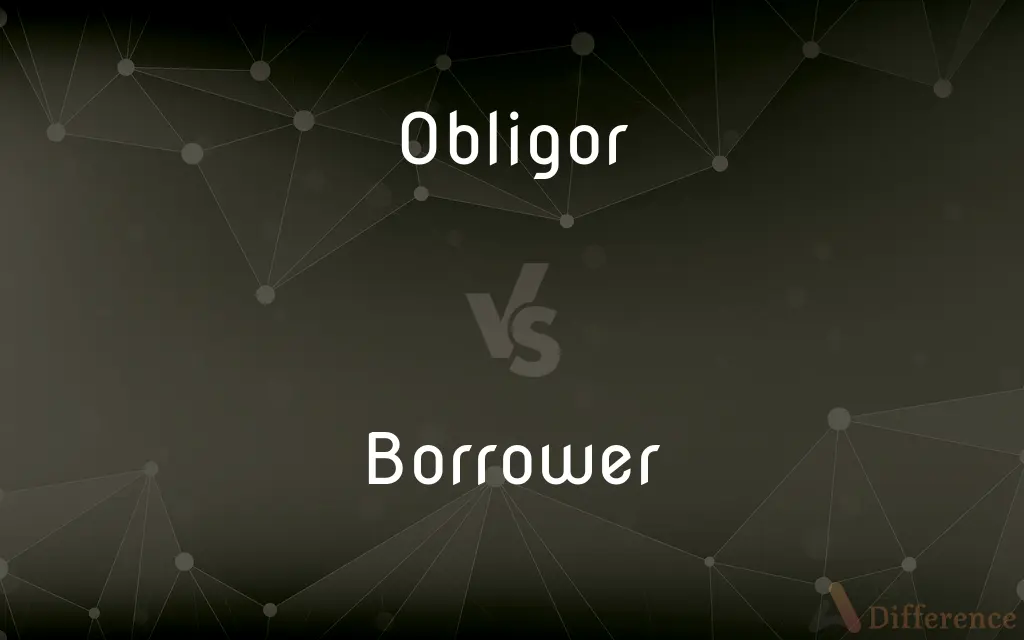Obligor vs. Borrower — What's the Difference?
By Tayyaba Rehman & Maham Liaqat — Updated on July 9, 2024
An obligor is a party obligated to fulfill a duty, often a debtor in a financial contract, while a borrower is specifically someone who takes a loan from another party, usually a financial institution.

Difference Between Obligor and Borrower
Table of Contents
ADVERTISEMENT
Key Differences
An obligor is a general term used to describe any individual or entity legally bound by a contract to fulfill an obligation, which could be repayment of debt, delivery of services, or performance of certain actions. This role extends beyond financial transactions to encompass a wide range of contractual duties. On the other hand, a borrower is a type of obligor whose obligation specifically involves repaying borrowed money, along with any agreed-upon interests or charges, to a lender over a set period.
While all borrowers can be considered obligors, not all obligors are borrowers. The term "obligor" applies to a broader category of contractual obligations, including but not limited to financial debts. For instance, an obligor might be required to provide a service, transfer property, or perform specific actions under the terms of a contract. Conversely, the borrower's responsibilities are confined to the context of a loan agreement, focusing solely on the financial aspects of repayment.
In financial contexts, both obligors and borrowers are subject to credit analysis to assess their creditworthiness and ability to fulfill their obligations. However, the criteria and considerations may vary; for obligors in non-financial agreements, the focus might be on their capacity to perform duties or deliver services as promised, whereas for borrowers, the emphasis is on financial stability and the ability to repay the loan.
The consequences of failing to meet obligations also differ between obligors and borrowers. While both face legal and financial repercussions, a borrower's failure typically results in financial penalties, additional interest charges, and potential loss of collateral. For other types of obligors, consequences might include legal action for breach of contract, demands for specific performance, or other remedies specified within the contract.
Understanding the distinction between an obligor and a borrower is crucial for legal and financial professionals, as it informs the approach to contract drafting, risk assessment, and dispute resolution. It highlights the importance of clarity in obligations and the specific nature of the contractual relationship.
ADVERTISEMENT
Comparison Chart
Definition
Party obligated to fulfill a duty in a contract
Party that takes a loan to be repaid
Scope of Obligation
Broad, covering any contractual duty
Specifically related to repaying a loan
Types of Obligations
Financial and non-financial
Financial repayments only
Role in Contracts
Can be involved in various types of contracts
Primarily involved in loan agreements
Consequences of Default
Legal action, specific performance demands
Financial penalties, loss of collateral
Compare with Definitions
Obligor
A debtor responsible for repaying borrowed funds.
In bond terms, the corporation acts as the obligor to the bondholders.
Borrower
An individual or entity that takes a loan.
The borrower must repay the mortgage over 30 years.
Obligor
An entity legally bound to fulfill a contract.
The obligor in the leasing agreement must ensure timely payments.
Borrower
An entity securing a mortgage.
The couple, as borrowers, put their home as collateral for the loan.
Obligor
A guarantor ensuring another's performance.
The parent company served as an obligor for its subsidiary's obligations.
Borrower
A party in a loan agreement.
The borrower agreed to the lender's terms for the personal loan.
Obligor
Any party with contractual duties.
As an obligor, the contractor must complete the construction by the agreed final line.
Borrower
Someone using credit to finance purchases.
As a borrower, she used the credit line to buy new equipment.
Obligor
A provider in a service agreement.
The company is the obligor in the agreement to deliver internet services.
Borrower
A user of funds with obligation to return.
The business became a borrower to expand its operations.
Obligor
One who is under obligation to another by contract or legal agreement.
Borrower
In subtraction, to take a unit from the next larger denomination in the minuend so as to make a number larger than the number to be subtracted.
Obligor
The party bearing a legal obligation to another party (the obligee).
Borrower
To obtain or receive (something) on loan with the promise or understanding of returning it or its equivalent.
Obligor
The person who binds himself, or gives his bond to another.
Borrower
To adopt or use as one's own
I borrowed your good idea.
Borrower
(Linguistics) To adopt (a word) from one language for use in another.
Borrower
To borrow something.
Borrower
(Linguistics) To adopt words from one language for use in another.
Borrower
One who borrows.
A library borrower's card
Borrower
One who borrows.
Neither a borrower nor a lender be.
Borrower
Someone who receives something on the promise to return it or its equivalent
Common Curiosities
What distinguishes an obligor from a borrower?
An obligor is bound by any contractual duty, while a borrower specifically owes repayment of a loan.
What happens if a borrower defaults on a loan?
The borrower faces financial penalties, additional interest, and potentially losing collateral.
Can an entity be both an obligor and a borrower?
Yes, if the entity has a contractual duty to fulfill, including repaying a loan, it is both an obligor and a borrower.
Can a borrower be considered an obligor?
Yes, all borrowers are considered obligors with the specific duty of repaying borrowed money.
Can an obligor’s duty extend beyond repaying money?
Absolutely, obligors’ duties can include delivering services, transferring property, or performing actions as agreed in contracts.
Do obligors and borrowers face different consequences for non-compliance?
Yes, consequences vary based on the nature of their obligations and the terms of their contracts.
How is creditworthiness assessed for obligors and borrowers?
For obligors, it depends on their capacity to perform duties; for borrowers, it focuses on financial stability and repayment ability.
What legal remedies exist for obligor default?
Remedies include legal action, demands for specific performance, or other contract-specified consequences.
Why is understanding the distinction important in finance?
It helps in risk assessment, contract drafting, and understanding legal and financial responsibilities.
How do contracts differentiate between obligors and borrowers?
Contracts specify the nature of obligations; borrowers' duties are explicitly related to loan repayments.
What is the role of collateral in borrower obligations?
Collateral secures the loan, providing the lender with an asset to claim if the borrower defaults.
Are the obligations of an obligor always financial?
No, obligors may have financial or non-financial duties based on their contract.
Can a single contract have multiple obligors?
Yes, contracts can involve multiple obligors, each with specified duties.
Is a guarantor considered an obligor?
Yes, a guarantor is an obligor since they guarantee the performance or obligations of another party.
How do societal and legal perspectives view obligors and borrowers?
Both are seen through their responsibilities and commitments under contracts, with specific legal frameworks governing their obligations.
Share Your Discovery

Previous Comparison
Welding vs. Soldering
Next Comparison
Baron vs. LordAuthor Spotlight
Written by
Tayyaba RehmanTayyaba Rehman is a distinguished writer, currently serving as a primary contributor to askdifference.com. As a researcher in semantics and etymology, Tayyaba's passion for the complexity of languages and their distinctions has found a perfect home on the platform. Tayyaba delves into the intricacies of language, distinguishing between commonly confused words and phrases, thereby providing clarity for readers worldwide.
Co-written by
Maham Liaqat















































